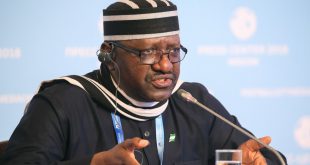France seal second World Cup triumph with a convincing 4-2 win over Croatia in a thrilling final. As exciting as Russia 2018, it’s a miserable World Cup for Africa’s representatives, with none of its flagbearers making it out of the group stages. What went wrong for them at the 2018 World Cup? Our Contributing Editor, Michael Nnaji examines their shortcomings and points the best way forward for African football.
The Brazilian football legend Pele once predicted that an African nation would win football’s most coveted prize before the turn of the last century. That prediction famously did not come to pass.
However, France’s triumph at Russia 2018 felt like some kind of victory for Africa as the French team of the famous bleu, blanc and bleur (black, white and Maghreb) clinched the Western European country’s second World Cup title following their success with a similarly multicultural team on home soil 20 years ago.

The French victory underlines – from an African perspective – the downside of economic migration with its attendant drain of resources. Indeed, three of the quarterfinalists (France, England and Belgium) paraded sons of immigrants from countries as diverse as the Congo, Nigeria, Mali, Cameroon, Guinea and Algeria, to name a few.
Ultimately, it was, result-wise, a miserable World Cup for Africa’s representatives, with none of its flagbearers making it out of the group stages. While the soul-searching and analyses begin in earnest following Africa’s poorest showing in 36 years at the Mundial, some issues need to be addressed if progress is to be made on football’s biggest stage.
In a prescient article by Paul Doyle of The Guardian, the author outlined reasons why Africa was set to excel or crash and burn at Russia 2018. At the end of the day, it was fine margins and percentages that sealed Africa’s fate.
In a group containing football heavyweights Spain and Portugal, the Atlas Lions of Morocco were fighting a lost battle from the word go. An unfortunate loss to supposed group whipping boys, Iran, only made their task even harder. However, Morocco emerged with credit, following some battling displays. Some crucial refereeing decisions went against them to ensure their early elimination. Defensively well organized and solid in midfield, they lacked a punch in the final third.

The Super Eagles of Nigeria were considered Africa’s strongest team at the World Cup. And although they exited the competition in the group stage, there are a lot of positives to be taken from their performances. They were, for starters, 7 minutes away from eliminating 2-time winners, Argentina, before a concentration lapse in defence put paid to their ambitions of progressing to the second round. After losing their first game to eventual finalist, Croatia, they battled to beat hard-fighting Iceland to set up a finale against Lionel Messi’s Argentina. Their manager, Gernot Rohr said before the tournament that his was a team for the future – Nigeria featured the youngest team of the tournament.
If any team was hard done by Mother Luck at Russia, then it has to be the Terenga Lions of Senegal who fell victim to the FIFA rule of separating teams by their fair play records if they were tied on points, goal difference and goals scored and conceded. Japan progressed at Senegal’s expense. The Lions, however, were at times a joy to watch – playing without fear going forward, but were careless at the back, especially against the Japanese who forced them to a 2-2 draw, rendering their final match against Columbia a do-or-die affair. They will still have left Russia with their heads held high, though. They made a statement by being the only African country with a local coach in the shape of Aliou Cisse. They will do well to build on the positives of Russia 2018.
The Carthage Eagles of Tunisia were effectively in a veritable group of death featuring Belgium and England (both of whom went all the way to the semi-finals), so analysis of their performances and early elimination have to be put into proper context. They fought gamely against England in their first game, nearly forcing a draw until they were undone by a late Harry Kane goal. Against a star-studded Belgian side they were clear underdogs and they duly suffered their second loss, setting the stage for their elimination. A consolatory win against minnows Panama proved to be academic in the final analysis.

The Pharaohs of Egypt went into this tournament seriously weakened by the injury to their star man, Mohammed Salah. A tree does indeed make a forest. Without Salah, Egypt huffed and puffed and were duly eliminated in a group that also comprised Uruguay, Saudi Arabia and hosts Russia. They failed to register a win in their second appearance at the world cup, following a barren run at Italia ‘90. The ultra-defensive tactics of their manager, Hector Cuper, did not help matters.
LESSONS FOR AFRICA
Football still a young man’s game
At the end of the day it does come to stamina and staying power, all attributes of youth. It is, therefore, no surprise that France, with the second youngest team (behind Nigeria) claimed the trophy. It underscores the imperative of catching them young by investing in the youth set-up with a view to establishing a distinct playing style.
The great Nigeria sides of the 90s, for instance, clearly profited from promoting youth players to the senior team. Most of them ended up at big European clubs where they continued to hone their skills. However, for some years now, European clubs are starting to invest in infrastructure and their young players, obviating the need to import foreign, nay African, talent.
Team spirit is key
This is plainly evident in both teams that contested the final, with both set of players fighting for one another on the pitch. Team spirit, allied with competence and good planning, always almost translates to success. The days of the mega superstars in football are long gone, mainly in part because of the widespread availability of top talents and rigorous training regimes, which serve to level the playing ground as it were.
Goals still football’s currency
Africa’s representatives cannot be accused of not giving their best on the pitch. In defence and midfield, they were generally solid. However, they all lacked the cutting edge in the final third which accounted for the poor return of goals and for their early elimination.
The respective managers seemed also to have missed the key development in football in recent years – set-pieces. France and England utilized this aspect of the game to their advantage. Hired foreign coaches would do well to strike a balance between defence and attack, while also acknowledging that African football is inherently about attacking. At Russia 2018, one came away with the impression that the African teams played with the handbrakes on, as if hamstrung in some tactical straitjacket.
Investment in Infrastructure and Human Resources will be key
Russia 2018 laid bare Africa’s deficits. The challenge now lies in going back to the drawing board and implementing a long-term plan to put the continent back on track. The talents are no doubt available. Management and investment in resources (both human and structural) will be crucial. Africa will do well to place the accent on youth development and taking the under-aged competitions more seriously. Local coaches should be sent abroad to help expose them to modern coaching techniques as well as the latest developments in sports science. Attention to detail will be of the essence.
In summary, the French triumph clearly demonstrates that footballing talent abound in Africa. The challenge lies in harnessing this huge potential to ensure success at football’s highest level. That a European team won the title for the fourth time in a row is no surprise. Europe is simply the football powerhouse of the world, largely down to its economic might and organizational prowess. At the end, it was a victory of sorts for Africa, nay its migrants, but there is still a lot of work to do for Pele’s prediction to be realized.
 THE AFRICAN COURIER. Reporting Africa and its Diaspora! The African Courier is an international magazine published in Germany to report on Africa and the Diaspora African experience. The first issue of the bimonthly magazine appeared on the newsstands on 15 February 1998. The African Courier is a communication forum for European-African political, economic and cultural exchanges, and a voice for Africa in Europe.
THE AFRICAN COURIER. Reporting Africa and its Diaspora! The African Courier is an international magazine published in Germany to report on Africa and the Diaspora African experience. The first issue of the bimonthly magazine appeared on the newsstands on 15 February 1998. The African Courier is a communication forum for European-African political, economic and cultural exchanges, and a voice for Africa in Europe.



